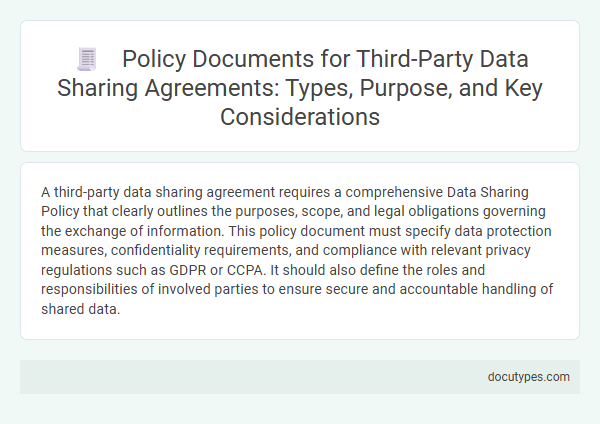A third-party data sharing agreement requires a comprehensive Data Sharing Policy that clearly outlines the purposes, scope, and legal obligations governing the exchange of information. This policy document must specify data protection measures, confidentiality requirements, and compliance with relevant privacy regulations such as GDPR or CCPA. It should also define the roles and responsibilities of involved parties to ensure secure and accountable handling of shared data.
Introduction to Third-Party Data Sharing Policies
Third-party data sharing policies are essential to define how organizations manage and protect data shared with external partners. These policies ensure compliance with legal requirements and safeguard sensitive information.
A clear and comprehensive third-party data sharing policy document outlines the scope, responsibilities, and data protection measures involved in sharing data externally. It typically includes provisions on data access, usage limitations, security protocols, and breach notification procedures. Establishing this policy helps mitigate risks associated with data misuse and ensures accountability among all parties.
Defining Third-Party Data Sharing Agreements
Defining third-party data sharing agreements involves specifying the terms under which data is exchanged between organizations and external entities. The policy document needed must outline data privacy, security requirements, compliance obligations, and permitted data usage. Clear definitions help ensure mutual understanding, risk management, and legal protection for all parties involved.
Types of Data Sharing Agreements
When engaging in third-party data sharing, selecting the appropriate policy document is crucial to ensure compliance and clarity. Understanding the types of data sharing agreements helps you protect sensitive information effectively.
- Data Sharing Agreement (DSA) - Establishes the terms and responsibilities for exchanging data between parties, focusing on data protection and usage.
- Data Processing Agreement (DPA) - Defines obligations for processing personal data on behalf of the data controller, ensuring compliance with privacy regulations.
- Non-Disclosure Agreement (NDA) - Protects confidential information during data sharing, preventing unauthorized disclosure to third parties.
Selecting the correct policy document aligns your data sharing practices with legal and security requirements.
Key Purposes of Policy Documents
What type of policy document is essential for third-party data sharing agreements? A comprehensive data sharing policy outlines the roles, responsibilities, and compliance requirements of all parties involved. It ensures legal protection, data security, and clarity on data usage rights and limitations.
Legal and Regulatory Compliance Requirements
Third-party data sharing agreements require a comprehensive Data Sharing Agreement (DSA) to ensure legal and regulatory compliance. This policy document outlines the obligations, responsibilities, and data protection measures required by law.
Including clauses on data privacy, security standards, and breach notification aligns the agreement with regulations like GDPR and CCPA. You must verify that the DSA addresses specific jurisdictional requirements to mitigate legal risks.
Essential Components of Data Sharing Policies
Third-party data sharing agreements require a clearly defined policy document that outlines responsibilities and security standards. Your policy must address legal compliance and data protection to ensure safe and transparent data exchanges.
Essential components of data sharing policies include the scope of data use, consent requirements, and breach response procedures.
- Purpose and Scope - Defines the data types shared, parties involved, and objectives of the sharing agreement.
- Data Privacy and Security - Specifies safeguards, encryption methods, and compliance with regulations like GDPR or HIPAA.
- Accountability and Breach Notification - Establishes roles for monitoring, auditing, and immediate reporting protocols for data incidents.
Risk Management and Data Protection Measures
A third-party data sharing agreement requires a comprehensive Data Protection Policy that outlines specific risk management protocols. This document should detail data usage limitations, encryption standards, and breach response procedures to ensure compliance with privacy regulations. Clear accountability frameworks and regular audit provisions are essential to protect sensitive information and mitigate potential data risks.
Roles and Responsibilities of Stakeholders
Choosing the correct policy document for third-party data sharing agreements is critical to define the roles and responsibilities of all parties involved. The policy ensures clarity and accountability, minimizing data risks and legal exposure.
- Data Sharing Agreement - Specifies the roles, responsibilities, and obligations of each stakeholder in handling shared data securely and legally.
- Privacy Policy Addendum - Details additional privacy and compliance requirements tailored to third-party data sharing scenarios.
- Data Protection Impact Assessment - Assesses risks related to data sharing and assigns accountability for mitigation to respective stakeholders.
Monitoring, Auditing, and Enforcement Practices
Third-party data sharing agreements require a comprehensive Data Sharing Policy that clearly outlines monitoring, auditing, and enforcement practices. This policy ensures compliance with data protection regulations and mitigates risks associated with unauthorized data access or misuse.
Effective monitoring includes real-time tracking of data transfers and access logs to detect anomalies. Auditing practices involve regular reviews and assessments of third-party compliance, while enforcement mechanisms establish penalties and corrective actions for policy violations.
What Type of Policy Document Is Needed for Third-Party Data Sharing Agreements? Infographic

